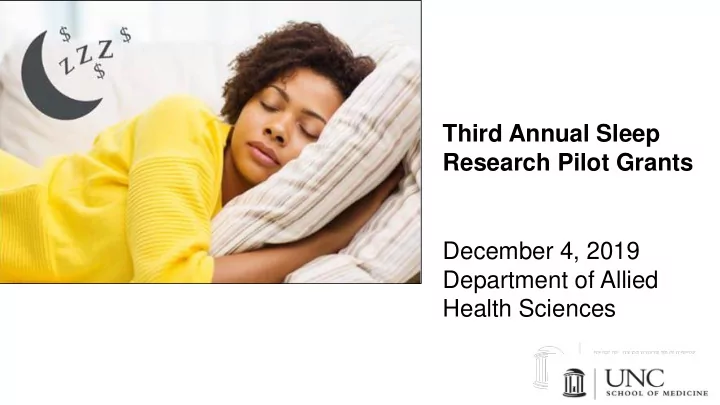

Third Annual Sleep Research Pilot Grants December 4, 2019 Department of Allied Health Sciences
Stephen Hooper, PhD. Associate Dean and Chair, Department of Allied Health Sciences Mary Ellen Wells, PhD, RPSGT, R. EEG T., R. NCS T. Director, Neurodiagnostics and Sleep Science Program Department of Allied Health Sciences Bradley Vaughn, MD, CPE Division Chief of Sleep and Epilepsy Professor Department of Neurology
Sleep Innovation Research Grant (SIRG) Program Goal: To build an internationally recognized program of research in sleep science at UNC-CH. • Provide research funding to conduct innovative sleep science research in the clinical or translational sciences. • Foster interdisciplinary research capacity in sleep science. • Facilitate extramural funding success among investigators with faculty or a post-doctoral fellow at UNC-CH. Sleep Innovation Research Grant (SIRG) Program
Funding Funds up to a maximum of $10,000 will be awarded for a one-year period . • 3 awards per year from 2018 - 2020 Sleep Innovation Research Grant (SIRG) Program
www.med.unc.edu/ahs
Funding
Types of research supported Any application proposing clinical or translational research meeting the NIH definition will be eligible. We will fund: • research across the translational continuum (T1-T4 research) • a variety of methodologies (e.g., qualitative, quantitative, single case) Sleep Innovation Research Grant (SIRG) Program Sleep Innovation Research Grant (SIRG) Program
Eligibility • Applicants must have a faculty-level appointment (tenure-track or fixed-term) or a post-doctoral fellowship appointment (with a faculty mentor) at UNC-CH. • Early Stage investigators are encouraged to apply. • No track record of research in sleep science is required. Sleep Innovation Research Grant (SIRG) Program
Important Dates RFAs announced December 4, 2019 Letter of intent due February 17, 2020 Application due March 31, 2020 Award announcement June 1, 2020 Funds made available July 17, 2020 (pending IRB approval) Sleep Innovation Research Grant (SIRG) Program
Letter of Intent (LOI) – due 2/17/2020 LOI Information LOI is required: PI’s Name (First and Last) • Not part of review process. PI’s Email PI’s Phone Number • Just to help us estimate the PI’s School or Departmental Affiliation number & type of expected grant grant applications for the PI’s Faculty Rank (with option for postdoc/name of faculty mentor) current funding cycle. Name and School/Departmental affiliation of all other key personnel Project Title • Once we receive your LOI, we will send you Project abstract – no more 2,500 characters including spaces an email confirmation. Sleep Innovation Research Grant (SIRG) Program
Application – due March 31, 2020 Page Limit Section 1 Cover Page (Title, Investigators, Affiliations, and 250-word abstract) 5 Biosketch of lead PI only Upload the materials, as a single PDF (maximum 13 pages) 1 Specific Aims max of 4 Research Strategy • Significance • Innovation • Approach with preliminary data (if any) • Future plans 1 Literature cited 1 Budget and budget justification Sleep Innovation Research Grant (SIRG) Program
Allowable and Non-Allowable Expenses Allowable Not Allowable Faculty/post-doc salary support X Consultants X Equipment costs of $5K or more X Indirect costs X Participant incentives X Graduate/Research Assistant tuition/fees X Graduate/Research Assistant hourly wages X Software – project specific X Supplies X Food X Computers (laptop or desktop) X Travel X
Review of Proposals • Pilot grant applications will be assigned to experienced grant reviewers who use NIH scoring guidelines. • In addition to providing scores for the project’s overall impact, significance, investigators, innovation, and approach , reviewers will answer the following questions: • Are plans for submitting future extramural grant application(s) specific and clear? • If the proposed pilot project is successful, will the findings yield sufficient preliminary data to support a future larger-scale grant application? • Does the proposal help to build interdisciplinary research capacity in sleep science and can the collaborations be ongoing and successful? Sleep Innovation Research Grant (SIRG) Program
Review of Proposals Reviewers will also answer the following questions: • Does the grant application include an investigator from the Department of Allied Health Sciences or Neurology? • Does the research fall under the category of clinical (patient-oriented research; epidemiologic and behavioral studies; outcomes and health services research)? • Does the research fall under the category of translational science (translation to humans, to patients, to practice or to population)? Sleep Innovation Research Grant (SIRG) Program
IRB Approval If the grant is awarded, we will not release funds until we have a copy of human subjects or vertebrate animal approval for your research from the IRB or IACUC office. Sleep Innovation Research Grant (SIRG) Program
Recommend
More recommend